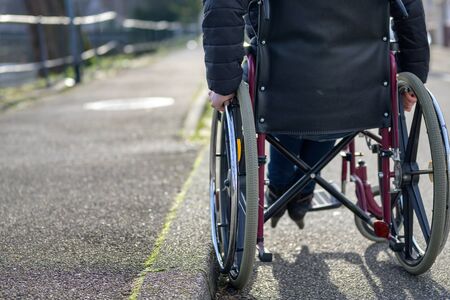Introduction to Spinal Cord Injury in the UK
Spinal cord injury (SCI) is a life-altering condition that significantly affects physical, psychological, and social well-being. In the United Kingdom, it is estimated that around 2,500 people sustain a spinal cord injury each year, with tens of thousands living with its long-term consequences. These injuries may result from trauma, such as road traffic collisions or falls, as well as from non-traumatic causes like illness or medical conditions. The impact of SCI extends beyond mobility challenges; individuals often face barriers related to employment, education, housing, and community participation. Within the UK context, the prevalence of SCI highlights the urgent need for comprehensive support systems—ranging from NHS healthcare provision to government-funded benefits and legal protections. Understanding the landscape of funding opportunities, statutory rights, and available benefits is essential for those affected by spinal cord injury and their families. This article will provide an in-depth exploration of how these elements interconnect within the British system to promote independence and quality of life for people living with SCI.
2. Sources of Funding and Financial Support
For individuals living with spinal cord injuries in the United Kingdom, accessing appropriate funding and financial support is vital for both immediate rehabilitation and long-term quality of life. The UK offers a range of government welfare benefits, NHS provisions, and charitable grants designed to meet diverse needs. This section provides a detailed exploration of these options, focusing on eligibility, application processes, and specific support available.
Government Welfare Benefits
The UK government has structured several key benefits to offer financial security for people with disabilities. The main sources include:
| Benefit Name | Description | Eligibility Criteria | How to Apply |
|---|---|---|---|
| Personal Independence Payment (PIP) | A benefit for individuals aged 16-64 who need help with daily activities or mobility due to disability. | Assessment based on daily living and mobility needs; not means-tested. | Apply via the Department for Work and Pensions (DWP) – phone or post. |
| Employment and Support Allowance (ESA) | Provides financial support if you are unable to work due to your condition. | Medical assessment required; both contributory and income-related ESA available. | Claim through Jobcentre Plus or Universal Credit portal. |
| Universal Credit | A monthly payment to help with living costs for those on low income or out of work, including disabled people. | Means-tested; includes elements for limited capability for work. | Apply online via the Government Gateway. |
| Attendance Allowance | A benefit for people over State Pension age who need help with personal care due to disability. | No mobility component; based on care needs rather than diagnosis. | Application form downloadable from GOV.UK or request by phone. |
NHS Support and Provision
The National Health Service (NHS) plays a crucial role in supporting people with spinal cord injury. Beyond medical treatment, the NHS may provide specialist equipment such as wheelchairs, pressure-relieving mattresses, home adaptations, and ongoing physiotherapy. Accessing these services typically involves referral from a GP or hospital consultant. In many cases, local Clinical Commissioning Groups (CCGs) manage funding decisions for continuing healthcare or rehabilitation packages tailored to individual needs.
NHS Wheelchair Services
NHS Wheelchair Services assess individuals’ requirements and supply appropriate chairs at no direct cost. This provision is often complemented by maintenance services and periodic reassessment as needs change over time.
Charitable Grants and Additional Support
A range of UK charities provide targeted grants and practical assistance for those affected by spinal cord injuries. These organisations can help bridge gaps where statutory funding does not reach:
| Charity/Organisation | Type of Support Offered | Access Criteria | How to Apply |
|---|---|---|---|
| Spinal Injuries Association (SIA) | Grants for specialist equipment, peer support, advocacy, advice on benefits. | SIA membership usually required; open to all affected by spinal cord injury. | Online application or contact SIA helpline. |
| The Back Up Trust | Bespoke courses, mentoring schemes, small grants for independent living aids. | Aimed at anyone with a spinal cord injury in the UK. | Email enquiry or apply via website forms. |
| The Royal British Legion | Financial assistance for veterans with spinal injuries, including mobility aids and home modifications. | Must have served in the UK Armed Forces or be a family member. | Contact local branch or apply online. |
| The Motability Scheme | Leasing vehicles using mobility allowance, vehicle adaptations included. | PIP recipients with enhanced mobility component are eligible. | Application managed through Motability dealerships nationwide. |
Navigating the System: Practical Tips
The process of claiming funding can be complex; therefore, it is advisable to seek advice from local Citizens Advice Bureaux or specialist disability advisors. Many charities also offer free guidance on completing benefit applications and appealing decisions if necessary. It is essential to keep thorough documentation of medical assessments and correspondence with service providers to ensure continuity of support.
This comprehensive framework of state welfare, NHS support, and charitable assistance forms the backbone of financial security for people with spinal cord injuries across the United Kingdom. Each scheme has unique criteria and routes of access but together they underpin both immediate rehabilitation goals and long-term independence.

3. Legal Rights and Protections
Individuals living with spinal cord injury (SCI) in the United Kingdom are afforded a robust set of legal rights and protections designed to ensure equality, dignity, and inclusion in society. These frameworks are primarily anchored in national legislation, with the Equality Act 2010 serving as the cornerstone for anti-discrimination measures. This act legally requires public bodies, employers, service providers, and educational institutions to make reasonable adjustments for people with disabilities, including those with SCI. Such adjustments might include accessible facilities, flexible working arrangements, or modifications to recruitment processes.
The Equality Act 2010
The Equality Act 2010 consolidates previous anti-discrimination laws and explicitly recognises disability as a protected characteristic. For individuals with spinal cord injuries, this means that it is unlawful for organisations to treat them less favourably because of their condition. The Act also introduces the concept of ‘reasonable adjustments’, which obliges employers and service providers to proactively remove barriers that could disadvantage disabled people. Failure to comply can result in legal action via employment tribunals or courts.
Workplace Rights
Employment rights for people with SCI are clearly delineated under UK law. The right not to be unfairly dismissed or discriminated against due to disability is fundamental. Employers must make workplaces accessible and implement necessary changes such as specialist equipment or adjusted work hours. Additionally, employees are entitled to paid time off for medical appointments related to their condition, as well as protection from harassment or victimisation linked to their disability.
Anti-Discrimination Laws
Beyond the workplace, anti-discrimination provisions extend into areas such as education, housing, transport, and access to goods and services. For example, public transport operators are mandated to ensure vehicles are accessible and staff are trained to assist passengers with mobility impairments. Educational institutions must provide tailored support plans so students with SCI can fully participate in academic life.
Practical Support and Advocacy
A number of statutory bodies—such as the Equality and Human Rights Commission—offer guidance and can investigate complaints relating to discrimination. Charities like Spinal Injuries Association also provide advocacy services and resources to help individuals understand their rights and navigate complex legal processes.
In summary, the legal framework in the UK provides comprehensive protection for people with spinal cord injuries, helping ensure that they can participate fully and equally in all aspects of life. Awareness of these rights empowers individuals to challenge discrimination and seek redress when necessary.
4. Access to Healthcare and Rehabilitation Services
For individuals living with a spinal cord injury (SCI) in the United Kingdom, access to appropriate healthcare and rehabilitation services is a fundamental right supported by national frameworks. The National Health Service (NHS) plays a pivotal role in delivering both immediate and long-term care for those affected by SCI. Upon sustaining an SCI, patients are typically admitted to one of the UK’s specialist spinal injury centres, which are designed to provide acute medical care, surgical interventions, and comprehensive rehabilitation tailored to individual needs.
NHS Services for Spinal Cord Injury
The NHS ensures that people with SCI receive holistic, multidisciplinary support throughout their recovery journey. Specialist spinal centres operate in collaboration with local hospitals and community services, offering a continuum of care from initial stabilisation to reintegration into daily life. These centres are staffed by expert teams comprising neurologists, physiotherapists, occupational therapists, psychologists, and social workers who work collaboratively to maximise patient outcomes.
| Service Type | Description | Availability |
|---|---|---|
| Acute Medical Management | Immediate intervention and stabilisation following injury; includes surgery where necessary. | Specialist Spinal Centres/NHS Hospitals |
| Rehabilitation Programmes | Intensive therapies aimed at restoring function and independence. | Specialist Spinal Centres/Community Clinics |
| Ongoing Outpatient Support | Follow-up appointments, pain management, continence advice, and psychological support. | NHS Facilities/Local GP Surgeries |
| Community-Based Rehabilitation | Home visits, peer mentoring, vocational training, and equipment provision. | Community Health Teams/Charities |
Specialist Spinal Centres in the UK
The UK boasts several renowned specialist spinal centres located in England, Scotland, Wales, and Northern Ireland. Each centre is equipped with advanced facilities and adheres to national guidelines such as the British Association of Spinal Cord Injury Specialists (BASCIS) standards. Admission to these centres is coordinated through NHS referral pathways, ensuring equitable access regardless of geographic location or socioeconomic status.
Community-Based Rehabilitation Resources
Beyond hospital-based care, community rehabilitation resources play a crucial role in supporting long-term adjustment for people with SCI. Local authority social services may offer home adaptations, personal assistance funding through Direct Payments or Personal Health Budgets, and links to voluntary sector organisations like the Spinal Injuries Association or Aspire. These charities often bridge gaps by providing peer support networks, equipment loans, housing advice, and advocacy services tailored specifically for those living with SCI.
The Importance of Integrated Care Pathways
An integrated approach—combining acute medical care with ongoing rehabilitation and community support—is essential for optimal outcomes. The NHS Long Term Plan emphasises personalised care planning and coordinated discharge processes so that individuals transitioning from hospital to home remain supported throughout their rehabilitation journey. This structure reflects a uniquely British commitment to universal healthcare access underpinned by legal rights and statutory benefits for all people facing life-changing injuries such as SCI.
5. Employment, Education, and Social Integration
For individuals living with spinal cord injuries in the United Kingdom, inclusion within the workforce, education system, and broader society is not just a matter of personal ambition but also a fundamental right supported by various legal frameworks and funding initiatives. This section examines the multifaceted support systems designed to enable access to employment opportunities, vocational training programmes, mainstream and further education, as well as pathways to active participation in community life.
Access to Employment
The UK’s legislative landscape, notably the Equality Act 2010, mandates reasonable adjustments in the workplace to prevent discrimination against people with disabilities. Employers are legally obliged to provide accessible work environments and flexible arrangements where required. Complementing this, schemes such as Access to Work offer practical and financial support for adaptations, specialist equipment, or assistance with travel costs. Charitable organisations like the Spinal Injuries Association (SIA) also provide tailored advice on CV writing, job searching, and interview preparation for those navigating return-to-work journeys post-injury.
Vocational Training and Further Education
Recognising that career aspirations may shift following a spinal cord injury, the UK government and local authorities offer vocational rehabilitation services aimed at skill development and retraining. Initiatives such as Disabled Students’ Allowances (DSAs) ensure that disabled students have equal access to higher education through funding for assistive technologies and personal support. Colleges and universities are required by law to provide inclusive learning environments—often supported by disability advisers who coordinate necessary adjustments for students.
Mainstream Education Support
From primary through secondary school, children with spinal cord injuries can benefit from Education, Health and Care Plans (EHCPs), which outline specific needs and resources required for meaningful participation in mainstream education. Local authorities must collaborate with families to implement these plans, ensuring accessibility of facilities and curriculum modifications where necessary.
Community Involvement
Beyond formal education and employment settings, social integration remains paramount. Community centres, sports clubs, and voluntary groups frequently offer inclusive activities designed for wheelchair users or those with limited mobility. Public transport improvements—such as step-free access at stations—and local authority grants for home adaptations further support independent living and active engagement in society. Through these interconnected support systems, individuals with spinal cord injury in the UK are better positioned to realise their potential across all facets of daily life.
6. Advocacy, Local Networks, and Peer Support
For individuals living with spinal cord injury in the United Kingdom, navigating the complexities of funding, benefits, and legal rights can be daunting without appropriate support structures. Advocacy organisations, local councils, and peer networks play a crucial role in ensuring that people affected by spinal cord injuries not only access their entitlements but also receive vital guidance and emotional support throughout their journey.
Key Organisations for Guidance and Advocacy
Several national charities specialise in supporting individuals with spinal cord injuries. The Spinal Injuries Association (SIA) is particularly prominent, offering expert advice on welfare benefits, legal matters, and practical challenges. Similarly, Aspire provides tailored services including housing advice and independent living support. These organisations often work closely with healthcare professionals to ensure a holistic approach to rehabilitation and reintegration into the community.
The Role of Local Councils
Local authorities across the UK have statutory responsibilities to assess care needs and provide services under the Care Act 2014. Councils facilitate access to personal budgets, home adaptations, mobility aids, and social care packages. They also act as gateways to information about local resources and can signpost individuals to relevant voluntary sector partners.
Mental Health Support and Community Wellbeing
Mental health is an integral aspect of recovery following a spinal cord injury. Many advocacy groups collaborate with NHS trusts and local mental health charities to deliver counselling, support groups, and crisis intervention services. Peer-led initiatives such as Back Up Trust’s mentoring programmes pair newly injured individuals with trained volunteers who have lived experience, fostering resilience and confidence through shared understanding.
The Importance of Peer Networks
Peer networks offer more than just emotional comfort; they serve as platforms for exchanging practical advice on topics ranging from employment rights to accessible travel. Regular meet-ups—both virtual and in-person—enable members to build friendships and reduce feelings of isolation commonly experienced after injury. These communities often advocate collectively for policy change at both local and national levels.
Accessing Support: How to Get Involved
Those seeking guidance or wishing to join a peer network can start by contacting leading charities or speaking to their local council’s adult social care team. Many organisations host events, workshops, and online forums open to all stages of the spinal cord injury journey. Getting involved not only empowers individuals but also strengthens the collective voice advocating for improved rights and resources across the UK.
7. Summary and Future Perspectives
The landscape of funding, benefits, and legal rights for people with spinal cord injury in the United Kingdom reflects a complex interplay between government provisions, charity sector involvement, and evolving legal frameworks. Over recent years, considerable progress has been made in enhancing financial support through schemes like Personal Independence Payment (PIP), Access to Work grants, and various social care allowances. Legal protections under the Equality Act 2010 have also been instrumental in addressing discrimination and promoting workplace inclusion.
Ongoing Initiatives
Many ongoing initiatives are driven by both governmental bodies and third-sector organisations such as the Spinal Injuries Association and Aspire. These efforts focus on improving access to benefits, raising awareness of legal entitlements, and providing practical assistance for independent living. The NHS continues to play a crucial role in rehabilitation and long-term healthcare provision, while local authorities are increasingly exploring person-centred approaches to social care funding.
Future Challenges
Despite these advancements, significant challenges remain. Navigating the benefits system can be daunting due to administrative complexity and periodic reassessments. There is also a persistent need for greater consistency in service provision across regions, as well as further investment in accessible housing and employment opportunities tailored to the needs of individuals with spinal cord injuries.
Looking Ahead
Looking forward, sustained advocacy will be essential to ensure that legislative reforms keep pace with changing societal attitudes and medical advances. It is crucial that policymakers continue to engage with people with lived experience of spinal cord injury when designing policies and allocating resources. Only through a collaborative approach—integrating statutory support, community initiatives, and robust legal protections—can the UK hope to create an environment where those affected by spinal cord injury can achieve full participation and equality within society.


